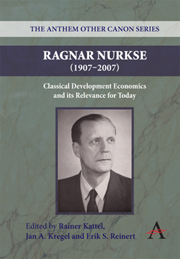Book contents
- Frontmatter
- Contents
- Preface
- Title in the series
- 1 The Relevance of Ragnar Nurkse and Classical Development Economics
- 2 Life and Time of Ragnar Nurkse
- 3 Nurkse and the Role of Finance in Development Economics
- 4 Early Development Theory from Sun Yat-sen to Ragnar Nurkse
- 5 The Roots of Unequal Exchange: Mihail Manoilescu and the Debate of the 1930s
- 6 Nurkse and the Early Latin American Structuralists: A Reflection on Development Theory, Industrialization and their Relevance Today
- 7 Lewis, the Long Wave and Industrialization in the Periphery
- 8 Ragnar Nurkse and the Law & Economics of Development
- 9 Ragnar Nurkse's Development Theory: Influences and Perceptions
- 10 Nurkse meets Schumpeter: Is Microfinance a ‘Silver Bullet’ to Economic Development?
- 11 Stockpiling of International Reserves and Development: a Misguided Link
- 12 International Currency Experience and the Bretton Woods System: Ragnar Nurkse as Architect
- 13 Some Reflections on Nurkse's Patterns of Trade and Development
- 14 India and Development Economics: External Influences and Internal Responses
- Notes
4 - Early Development Theory from Sun Yat-sen to Ragnar Nurkse
Published online by Cambridge University Press: 05 March 2012
- Frontmatter
- Contents
- Preface
- Title in the series
- 1 The Relevance of Ragnar Nurkse and Classical Development Economics
- 2 Life and Time of Ragnar Nurkse
- 3 Nurkse and the Role of Finance in Development Economics
- 4 Early Development Theory from Sun Yat-sen to Ragnar Nurkse
- 5 The Roots of Unequal Exchange: Mihail Manoilescu and the Debate of the 1930s
- 6 Nurkse and the Early Latin American Structuralists: A Reflection on Development Theory, Industrialization and their Relevance Today
- 7 Lewis, the Long Wave and Industrialization in the Periphery
- 8 Ragnar Nurkse and the Law & Economics of Development
- 9 Ragnar Nurkse's Development Theory: Influences and Perceptions
- 10 Nurkse meets Schumpeter: Is Microfinance a ‘Silver Bullet’ to Economic Development?
- 11 Stockpiling of International Reserves and Development: a Misguided Link
- 12 International Currency Experience and the Bretton Woods System: Ragnar Nurkse as Architect
- 13 Some Reflections on Nurkse's Patterns of Trade and Development
- 14 India and Development Economics: External Influences and Internal Responses
- Notes
Summary
Introduction
Though Rosenstein-Rodan's (1943) ‘Problems of Industrialisation of Eastern and South-Eastern Europe’ is often attributed as being the work that initiated the birth of development economics as a field, as argued by Chakravarty (1983), a broader reading of the relevant literature shows that the theoretical formation of development economics and the discussion on the pertinent ideas began much earlier as a thorough theoretical and history of thought analysis of Allyn Young's classical endogenous growth vision shows (see Perälä 2002, 2006). Interestingly, there are other earlier contributions in the field of economic development consistent with the classical endogenous growth process, most notably a number of contributions by Sun Yat-sen: San Min Chu I: The Three Principles of the People (1953a), The International Development of China (1922), and Fundamentals of National Reconstruction (1953b), some written over four decades and published nearly two decades before the heralded work by Rosenstein-Rodan, to which a mere mention or limited recognition exists in the contemporary economics literature. Given the breadth of his development analysis and writings, Sun Yat-sen, though largely neglected by the profession, can be considered to be one of the earliest pioneers of economic development.
Given that Sun Yat-sen was much more of a development practitioner than an academic economist, interesting aspects in his development perspective are apparent. Most notably, his analysis is not limited by the theoretical body of thought or motivated by the shortfalls of the neoclassical economics analysis that was gaining prominence within the academic economic circles at the time and has become dominant especially during the latter half of the twentieth century.
- Type
- Chapter
- Information
- Ragnar Nurkse (1907–2007)Classical Development Economics and its Relevance for Today, pp. 79 - 102Publisher: Anthem PressPrint publication year: 2009



